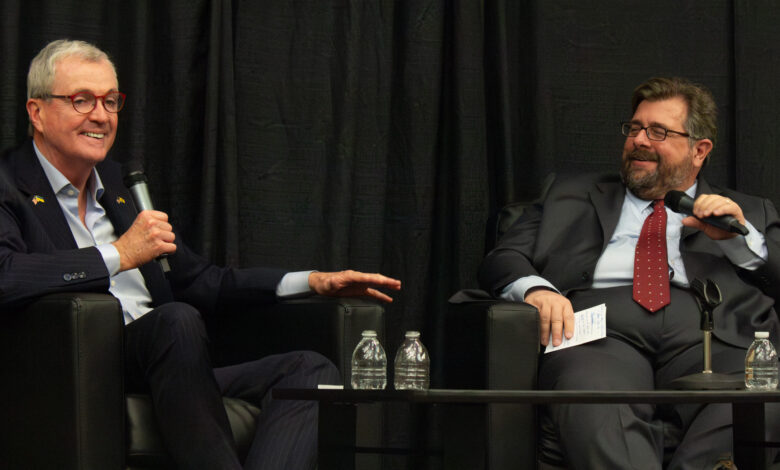
NJ Gov. Murphy makes return to Rider
By Julia Train
New Jersey Gov. Phil Murphy was welcomed back to Rider’s campus with a full crowd in Daly Dining Hall to discuss topics like nationwide book bans, plastic use in New Jersey, public transportation and more.
The Rebovich Institute for New Jersey Politics hosted the event on March 5, bringing the Democrat back to campus for the first time since 2019, a year after Murphy began his first term.
Micah Rasmussen, director of the Rebovich Institute, asked him to speak at the university and Murphy agreed, but said he wanted to get to know the director before visiting. So the two grabbed coffee and chatted.
This time, however, was Murphy’s idea.
“Usually I’m the one reaching out, but he reached out. He said, ‘It’s been a while, I want to come back,’” said Rasmussen.
In a fireside-chat-style discussion, Murphy and Rasmussen sat on a stage in black, leather lounge chairs at the front of Daly Dining Hall’s Mercer Room.
Each table sat eight attendees with hors d’oeuvres on metal trays in the middle and a water bottle at each seat. State troopers, public safety officers and security personnel were scattered along the walls and outside the building.
Freshman political science major Tyler Harder introduced Murphy before he and Rasmussen started their conversation.
There were 150 people registered and 128 seats set up.
Due to the governor having a commitment after the event, the interview lasted exactly an hour with questions sent to Rasmussen beforehand.
‘A three-legged stool’
The two covered a wide range of topics, from New Jersey’s budget and its trajectory, to fixing NJ Transit and the state hosting the FIFA World Cup Finals.
Murphy said he got elected based on “a three-legged stool,” meaning his three main initiatives, which included growing the state’s economy, addressing inequities and making New Jersey a “trustworthy state” again.
“Almost everything we do feeds into that,” he said.
The governor spent a chunk of time at the beginning talking about what his administration has been working on education-wise.
“Education has been center stage in our administration every minute that I’ve been in office, ” said Murphy.
He said the administration is working on making higher education more accessible, fully funding grades K-12 and making full-day pre-K free, saving families tens of thousands of dollars a year.
Along the economic lines, he also mentioned affordable healthcare and housing, creating more jobs and getting the state out of debt.
He used an analogy that every state has a bumper-sticker saying, and New Jersey’s is “The number one state to raise a family,” affordability being a pillar of that quote’s claim.
Murphy said that New Jersey is currently spending more money than it is making, keeping a structural deficit that has been in place since the late 1990s.
After about six and a half years in the position, he wants to set up the state to have money five years from now and thinks that it’ll see a steep increase in revenue trajectory after he leaves the office.
“Hone your skills”
Murphy said that he grew up in a poor family, leading him to become obsessed with pursuing a career that would make him money. Because of this, he majored in economics at Harvard University.
The 66-year-old governor said that when he hires people, it doesn’t matter what they majored in at college; what matters is their talent, drive and loyalty.
Although Murphy said being governor is “an honor of a lifetime” and economics wound up helping him, he didn’t do it for the right reasons.
He gave advice to the students in the room to “pursue something that lights you up,” because he’s a “big believer to start out wide and hone your skills.”
Protecting different identities
Among widely discussed topics, not only in schools across the country, but also in local communities, are antisemitism and Islamophobia, which were already problems before the start of the Israel-Hamas war on Oct. 7.
Murphy said that one of New Jersey’s assets is that it is the most densely populated and diverse state in the country.
He mentioned that the state is working on diversity in religion, race and LGBTQIA+ identities. However, rates of depression, drug use, homelessness and suicide are still high, specifically in the transgender community.
After the event, Murphy quickly took pictures with a handful of people and left, telling Rasmussen he wants to come back before he’s finished as governor.
“It was good to have the governor here, talk about New Jersey and what it has to offer and what the youth can do to make the state better,” said Naa’san Carr, a senior political science major and president of Rider’s Student Government Association.


